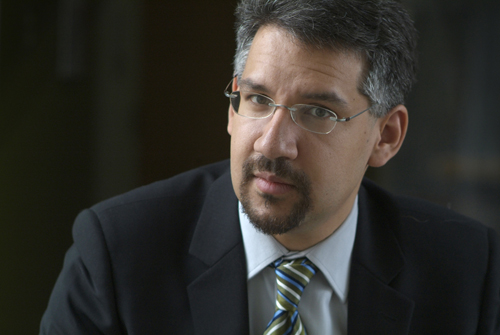
Political science professor David MacDonald has heard some “pretty horrible” stories, and he takes his responsibility to those who have shared their experiences seriously. “People trust me to be careful with their stories. These are sensitive issues, especially for the people involved, and I think it’s important to be open-minded about what people have to say rather than making rash judgments one way or another. I’m not into reducing the stories to sound bites.”
Each story adds another little piece to the mosaic MacDonald is collecting as part of his current research into the experiences of First Nations children and youth in residential schools in Canada, a project funded by the Social Sciences and Humanities Research Council of Canada that will continue to April of next year.
“Many people feel that genocide was committed when so many children were removed from their families and placed in these schools,” explains MacDonald. “The concept of genocide in international law is complex, though. And genocide is defined differently in Canada than in many other places.”
That’s largely due to the Canadian government’s self-protective instincts, he adds. In the original convention on genocide in 1947, a section on cultural genocide was included that would cover situations where particular languages, religions and traditions were actively destroyed. Canada pushed strongly against including cultural genocide along with some other countries, and they ultimately won. Another section, on the forced transfer of children from one group to another, is part of the international convention but was not made part of the Canadian criminal code.
MacDonald feels that it’s clear that there was forced transfer of children into residential schools, so that even with the somewhat watered-down international convention, this could potentially still qualify.
To learn more about what happened in those schools, MacDonald has interviewed numerous residential school survivors and government officials, as well as attended Truth and Reconciliation Commission of Canada (TRC) events and statement gatherings, healing circles and conferences, where many survivors shared their experiences.
In one public statement gathering, for example, a man described the electric chair that was used in St. Anne’s School in Ontario. “This man was repeatedly strapped into the chair and shocked by a nun who did this for fun. She would be standing there laughing at him as he struggled. His sister, at the same school, was sexually abused on a regular basis by a bishop.”
Teachers who were reported for these behaviours were rarely punished or even fired. The children who complained were considered troublemakers or liars. Even when a teacher’s problems became obvious, “It was easier to ship them out than to fire them, so they tended to send them to schools further west,” says MacDonald.
Beyond these abusive experiences, he adds, the children suffered significant losses. “The children didn’t have a chance to learn parenting skills in the schools, and they often lost their language and traditions. They felt the churches who ran the schools were trying to suppress who they were.” Some spoke of feeling ashamed of their skin colour when they were children and trying to wash it off.
As a result, many who were forced to attend the schools developed ongoing serious problems. “One man who spoke brought out an old black-and-white photo of his residential school class. Of the entire group, he was the only one still alive,” says MacDonald. “The others all died from drinking or drugs, accidents, and more generally, the inability to cope with the trauma they’d been through.”
While MacDonald believes that these experiences could fit that aspect of the genocide convention, which covers forced transfers, he says the next question is “so what? Where do we go from here? I think things are changing in Canada, and perhaps the time is right for reconciliation.” He adds, though, that these experiences have left the First Nations peoples with a very different perception of Canada and the Canadian government than the majority.
“Many First Nations people see aspects of the Canadian state as illegitimate. Their land was taken by force or by trickery, and they don’t see themselves as Canadians but as tied to their traditions, their ancestral lands, and their people. They see the state as committing genocide and still profiting from that. So reconciliation is difficult.”
The TRC, a five-year project which began in 2009, is collecting information and statements from residential school survivors across Canada and other people who were affected by the residential school system. The TRC will make recommendations for reconciliation in 2014. But its funding is running out. It has received only $60 million in total funding, and MacDonald points out, “At the same time, the government will provide $28 million for activities to commemorate the War of 1812.”
In addition, Canada now has a very multicultural population. How does reconciliation with the First Nations look to people who have come here from Trinidad, the Philippines or India? That’s the issue MacDonald hopes to explore next.
He’s experienced one possible approach to reconciliation during his time teaching in New Zealand. The indigenous people there – the Maori – “have a lot more political power,” says MacDonald. “New Zealand has kind of a bi-national identity. The Maori language is officially recognized and taught in schools, and they have guaranteed Maori seats in parliament. New Zealand is an example of where Canada could be in 20 years, if we want that. We need to see the need for reconciliation not as a problem, but as an opportunity to enrich the country.”